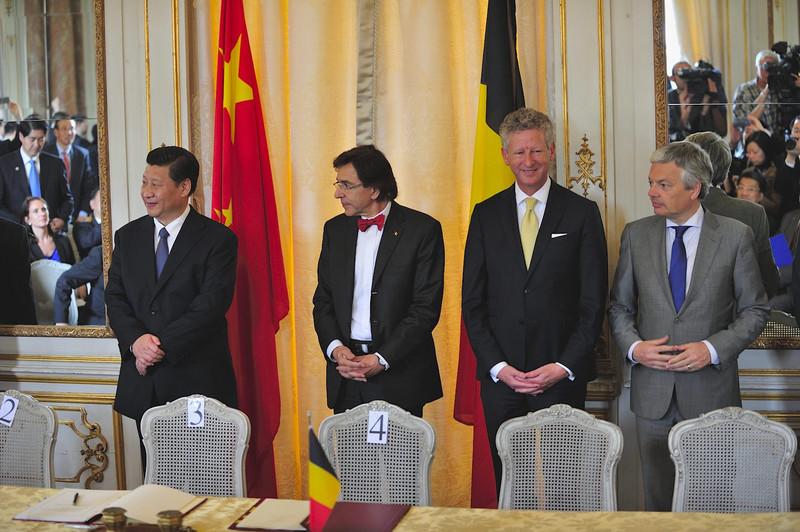"This area [biological warfare and vaccines] is of great interest to Chinese [intelligence] services." "It's unfair." Claimed Belgium. "China uses its elite espionage capabilities to steal all our clever WMDs, wah!"
 By Tyler Durden: Belgian intelligence suspects Chinese spies of targeting biological warfare and vaccine experts,
according to Belgium's security service, which also believes Beijing is
targeting the Belgium office of British pharmaceutical giant and
vaccine manufacturer GlaxoSmithKline (GSK) as well as domestic high-tech
firms, according to EU Observer.
By Tyler Durden: Belgian intelligence suspects Chinese spies of targeting biological warfare and vaccine experts,
according to Belgium's security service, which also believes Beijing is
targeting the Belgium office of British pharmaceutical giant and
vaccine manufacturer GlaxoSmithKline (GSK) as well as domestic high-tech
firms, according to EU Observer.The suspicions were detailed in confidential Belgian reports dated from 2010 to 2016, seen by EUobserver.China's EU mission has denied any wrongdoing, and said that they've always acted "in accordance with local laws."
They were meant to alert Belgian authorities to the threat of Chinese military, scientific, and medical espionage.
But the Belgian suspicions have no direct link to the current coronavirus pandemic, which started in China in December 2019 due to natural causes, according to the scientific consensus.
And the reports, which were written by Belgium's homeland security service, the Veiligheid van de Staat (VSSE), nowhere accused China of having a covert biological weapons programme. -EU Observer
That said, one of the 2016 reports reads: "This area [biological warfare and vaccines] is of great interest to Chinese [intelligence] services. Both defensively, because China, due to its overpopulation, is very exposed to epidemics, as well as offensively, since it has studied Ebola as an offensive vector."
The Belgian intelligence reports used multiple human informants, while the security service also says that China wasn't the only country showing interest in the subject. Top Belgian bioweapons expert Jean-Luc Gala reportedly had a "suspicious" Russian assistant.
Former Belgian bioweapons expert and inspector for the military, Martin Zizi, told EU Observer "I was as much a target from the US, Russian, Chinese, or even African sides." The VSSE report says that Zizi was targeted by Chinese spies in 2010 when he was a science professor at the Vrije Universiteit Brussel (VUB).
He was very friendly with a Chinese scientist, whom he had "introduced into the scientific and medical milieu" in Belgium, the VSSE said.Jean-Luc Gala - a retired colonel and current the head of the Centre de Technologies Moléculaires Appliquées (CTMA), a Belgian military-private joint venture that does bioweapons research - was also targeted by China when he was using mobile laboratories deployed in remote areas of Guinea testing Japanese anti-viral drug Avigan, which is now being researched as a potential coronavirus treatment.
But the Chinese scientist used to be a military doctor in the Chinese army, the VSSE noted, and "she might keep too-close ties with her country in general and her former employer in particular", it added.
"She was obviously MSS," the Belgian security source told EUobserver, referring to China's Ministry of State Security (MSS). -EU Observer
The CTMA itself was described as being "ahead of its time on the subject of bioterrorism", by the Belgian spy service.Read the rest of the report here.
It is located on the campus of the Université catholique de Louvain (UCL) in Louvain-la-Neuve in central Belgium.
But a few years ago, the VSSE noted that two suspicious Chinese entities had opened offices on a different floor of the same campus building that housed units of the Belgian bioweapons institute.
The first one, Beijing ZGC Science Park, folded in 2018, and had been a "non-specialised wholesale trade" company, according to its declarations in the National Bank Belgium.
The second one, Shenzhen European Office, is a branch of a Chinese regional development agency and is still operating at the same UCL address.
But one of its top people, a Chinese official, fell under suspicion because he had been "remarkably idle" in public terms for five years since arriving in Belgium, the VSSE said in a report in July 2016. -EU Observer
Source
No comments:
Post a Comment